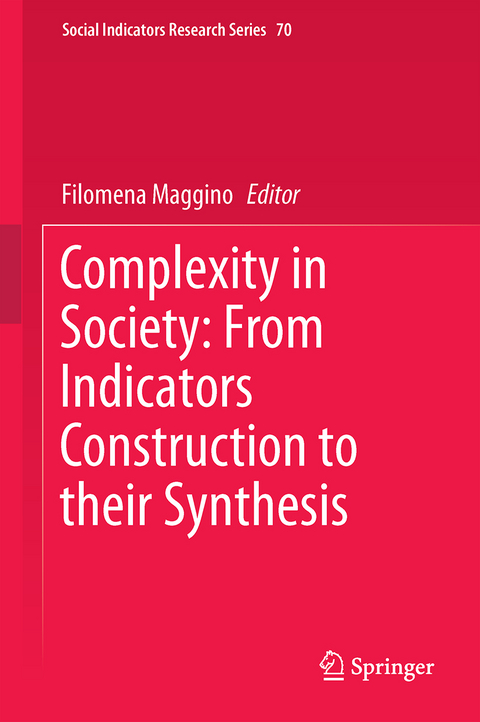
Complexity in Society: From Indicators Construction to their Synthesis
Springer International Publishing (Verlag)
978-3-319-60593-7 (ISBN)
Professor of Social Statistics and Multivariate Statistical Analysis at the University of Florence. Coordinator of the International II level master “QoLexityMeasuring, Monitoring and Analysis of Quality of Life and its Complexity” (University of Florence). Her main research interests concern: (i) data production (in particular, subjective data assessment), (ii) data analysis (in particular, multivariate and dimensional analysis, scaling models and construction of composite and synthetic indicators), and (iii) data presentation and dissemination (with particular reference to defining a model aimed at assessing the quality of communication in statistics). Main field of application is quality-of life and wellbeing measurement and analysis. She is author of many publications on those topics. President of the Italian Association for Quality-of-Life Studies (AIQUAV). Past-president of the International Society for Quality-of-Life Studies (ISQOLS). Component of the Global Project Research Network on Measuring the Progress (established at OECD). Component of the Scientific Committee for the Measurement of Wellbeing (Commissione scientifica per la misura del benessere) established at Italian National Institute of Statistics (ISTAT). Component of the Expert Group on Quality of life, established at Eurostat – European Commission. She cooperates with and is advisor of the Italian National Institute of Statistics (ISTAT) with reference to quality-of-life and wellbeing issues. She is member of several international associations, many scientific journals’ editorial board, scientific committees and session organizer/chair of numerous international conferences. Editor-in-Chief (from 01/01/2014) of Social Indicators Research journal (Springer).
Part I. Conceptual issues.- Chapter 1. Epistemology of Complexity (Alberto Peruzzi).- Chapter 2. Building Knowledge. Between Measure and Meaning: A Phenomenological Approach (Rocco Sacconaghi).- Part 2. Methodological Issues.- Chapter 3. Socio-Economic Statistics for A Complex World: Perspectives and Challenges in the Big Data Era (Marco Fattore).- Chapter 4. Developing Indicators and Managing the Complexity (Filomena Maggino).- Chapter 5.- Dealing with Syntheses in a System of Indicators (Filomena Maggino).- Chapter 6. Scalability of Composite Indices: Complexity Complications (Kenneth C. Land, Vicki L. Lamb, Xiaolu Zang).- Part 3. Technical Issues.- Chapter 7. Synthesis of Indicators: The Composite Indicators Approach (Matteo Mazziotta & Adriano Pareto).- Chapter 8. Synthesis of Indicators: The Non-Aggregative Approach (Marco Fattore).- Chapter 9. The Role of Extended IRT Models for Composite Indicators Construction (Michela Gnaldi, Simone Del Sarto & Filomena Maggino).- Part 4. Particular Experiences.- Chapter 10. Synthesis of Indicators Through Weighting: The Experiences of Quality of Life Measures (Chang-Ming Hsieh).- Chapter 11. The Role of Normalization in Building Composite Cndicators. Rationale and Consequences of Different Strategies (Ludovico Carrino).- Chapter 12. Steps Towards a Synthetic Measure Derived from a Partially Ordered Set (Giovanna Boccuzzo & Giulio Caperna).- Chapter 13. Joint analysis of Structural Models and Performance: Merging Clustering and Composite Indicators in the Analysis of Europe 2020 strategy (Tommaso Rondinella & Elena Grimaccia).
| Erscheinungsdatum | 24.08.2017 |
|---|---|
| Reihe/Serie | Social Indicators Research Series |
| Zusatzinfo | XI, 332 p. |
| Verlagsort | Cham |
| Sprache | englisch |
| Maße | 155 x 235 mm |
| Gewicht | 672 g |
| Themenwelt | Studium ► Querschnittsbereiche ► Prävention / Gesundheitsförderung |
| Sozialwissenschaften ► Soziologie ► Empirische Sozialforschung | |
| Schlagworte | communication of synthetic indicators in socio-eco • communication of synthetic indicators in socio-economics • Developing indicators and managing the complexity • From Indicators to their Synthesis • Knowledge needs in a complex and dynamic world • Methodology of the Social Sciences • Quality of Life Research • Scalability of Composite Indices • social & ethical issues • Social & ethical issues • Social research & statistics • Social research & statistics • Social Sciences • society & social sciences • Society & Social Sciences • Sociology • Statistics for Social Science, Behavorial Science, • the composite indicators approach |
| ISBN-10 | 3-319-60593-3 / 3319605933 |
| ISBN-13 | 978-3-319-60593-7 / 9783319605937 |
| Zustand | Neuware |
| Informationen gemäß Produktsicherheitsverordnung (GPSR) | |
| Haben Sie eine Frage zum Produkt? |
aus dem Bereich


